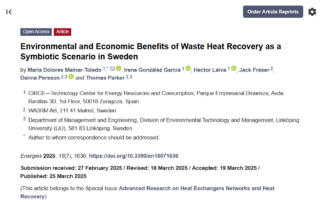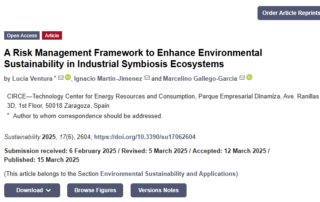D10.4: Final exploitation plan (CO)
Publishable Summary: This deliverable aimed to present the final version of the exploitation plan and the intellectual property rights (IPR) strategy of the technologies and solutions implemented by three ‘lighthouse’ and three ‘follower’ demo cases
D10.3: Recommendations for the standardisation committees (PU)
Publishable summary: Task 10.3 of the CORALIS project aims to improve the current industrial symbiosis (IS) landscape by promoting more efficient energy management systems and promoting the integration of circular economy principles. It serves as
D7.5 Preliminary results of the Brescia industrial campaign (CO)
Publishable summary: This report aims to demonstrate the developed production process and recovery solutions in the relevant industrial environment in the territory of Brescia (Figure 1). To this end: - Torbole has checked the separation
Decision-Making and Selection Framework for Potential Implementation of Concentrated Solar Power Technologies: Case Study
Abstract: The decarbonization of industrial processes requires efficient and scalable renewable energy solutions. Concentrated Solar Power (CSP) technology stands out by providing both electricity and high-temperature heat, yet its optimal deployment remains a challenge. This
Insights from CORALIS Learnings Webinar #5: Financing Initiatives for the Implementation of Industrial Symbiosis
On 14th of March 2025, our project partners from Linköping University (LiU) hosted its 5th learnings webinar, focusing on one of the most pressing challenges in the implementation of industrial symbiosis: financing. The session brought together key
New Publication Based on CORALIS: Environmental and Economic Benefits of Waste Heat Recovery as a Symbiotic Scenario in Sweden
Industrial symbiosis (IS) is increasingly recognised as a key strategy for enhancing resource efficiency and reducing environmental impact. A newly published study, "Environmental and Economic Benefits of Waste Heat Recovery as a Symbiotic Scenario in
Environmental and Economic Benefits of Waste Heat Recovery as a Symbiotic Scenario in Sweden
Abstract: This study pioneers a combined Life Cycle Assessment (LCA) and Life Cycle Costing (LCC) evaluation of an industrial symbiosis (IS) case involving waste heat recovery from a pulp and paper mill to a tomato
New publication based on CORALIS: A Risk Management Framework to Enhance Environmental Sustainability in Industrial Symbiosis Ecosystems
Industrial symbiosis (IS) fosters collaboration between industries to exchange materials, energy, water, and by-products. By optimising resource use and reducing waste, IS contributes to both environmental and economic sustainability. However, effective risk management remains a
New Publication based on CORALIS: Advancing Sustainability Through Industrial Symbiosis: A Technoeconomic Approach Using Material Flow Cost Accounting and Cost–Benefit Analysis
Industrial symbiosis (IS) enhances resource efficiency by enabling industries to exchange waste materials and energy flows. However, ensuring the economic viability of these exchanges is crucial for their long-term success. A newly published study by
A Risk Management Framework to Enhance Environmental Sustainability in Industrial Symbiosis Ecosystems
Abstract: Industrial symbiosis (IS) fosters collaboration between industries to exchange materials, energy, water, and by-products. It contributes to environmental and economic sustainability by reducing resource consumption, decreasing greenhouse gas emissions, and generating economic benefits. However,





